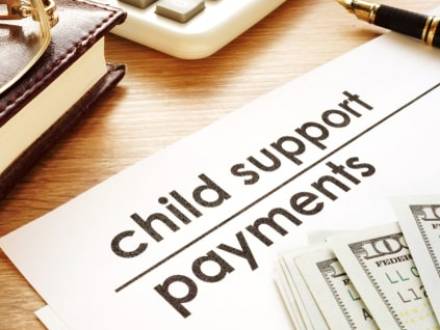630-462-9500
After Hour New Client Telephone Number 630-690-6077
1776 S. Naperville Road, Building B, Suite 202,
Wheaton, IL 60189
Recent Blog Posts
Can Moms Be Ordered to Pay Child Support in Illinois?
 A little more than five decades ago, a woman could not even obtain a credit card without her husband’s signature. Significant strides have been made by women since then, and today, more women are earning university degrees and even graduate degrees than men. This means that more women today are the primary breadwinners for their families.
A little more than five decades ago, a woman could not even obtain a credit card without her husband’s signature. Significant strides have been made by women since then, and today, more women are earning university degrees and even graduate degrees than men. This means that more women today are the primary breadwinners for their families.
Changes in the economic status of many women are reflected in the allocation of parental responsibilities and in the awards of child support. At one time, moms were more likely to be awarded primary parenting time with the children, and dads were more likely to pay child support, but neither of these is true today.
Fathers are often awarded more parental responsibilities and parenting time than mothers, and mothers are just as likely as fathers to be ordered to pay child support. If you have concerns about which parent will be ordered to pay child support, talk to a Wheaton, IL family law attorney who can answer your questions and guide you through the process.
What is a Bifurcated Divorce?
 In the realm of divorce proceedings, a term that sometimes arises is "bifurcated divorce." There are many potential implications of a bifurcated divorce that can benefit from a knowledgeable divorce attorney. Understanding this unique approach to divorce allows those facing complex marital situations to make more informed decisions about their legal options. Like other forms of divorce, a Wheaton, IL divorce lawyer is an essential resource for couples going through traditional divorce or a bifurcated divorce.
In the realm of divorce proceedings, a term that sometimes arises is "bifurcated divorce." There are many potential implications of a bifurcated divorce that can benefit from a knowledgeable divorce attorney. Understanding this unique approach to divorce allows those facing complex marital situations to make more informed decisions about their legal options. Like other forms of divorce, a Wheaton, IL divorce lawyer is an essential resource for couples going through traditional divorce or a bifurcated divorce.
What is the Meaning of a Bifurcated Divorce?
Bifurcation refers to dividing a divorce case into two separate parts or stages. In the context of a divorce, it essentially means that the legal dissolution of the marriage is granted before all remaining issues, such as property division, child custody, and spousal support, are completely resolved. This approach allows couples to efficiently obtain a legal divorce while continuing to negotiate or litigate the remaining matters.
Is Daycare Included in Child Support?
 More than two-thirds of the children in the United States who are not in school have parents who are in the workforce. This makes childcare critical, not only for working parents but also for the early learning and development of the children. Options for childcare can be limited, and costs are high. Many parents barely make enough at their jobs to pay for childcare. High-quality childcare is simply inaccessible for many families in the United States.
More than two-thirds of the children in the United States who are not in school have parents who are in the workforce. This makes childcare critical, not only for working parents but also for the early learning and development of the children. Options for childcare can be limited, and costs are high. Many parents barely make enough at their jobs to pay for childcare. High-quality childcare is simply inaccessible for many families in the United States.
In the state of Illinois, there were approximately 813,447 children under the age of six in 2023. A significant portion of those children (135,348) also lived in poverty. The percentage of those children whose parents both worked was 71.1 percent. 89,745 parents reported quitting a job, not taking a job, or significantly changing their jobs because of childcare problems.
How Do Narcissists React to Divorce?
 Divorce can be challenging, regardless of the relationship between spouses. When one spouse exhibits traits of narcissism, the situation becomes much more complex. Those with narcissistic personality disorder (NPD) are fueled by an inflated sense of self-importance, which can trigger unique or totally unexpected responses to divorce. Some have even labeled a divorce with a narcissist a "psychological battlefield."
Divorce can be challenging, regardless of the relationship between spouses. When one spouse exhibits traits of narcissism, the situation becomes much more complex. Those with narcissistic personality disorder (NPD) are fueled by an inflated sense of self-importance, which can trigger unique or totally unexpected responses to divorce. Some have even labeled a divorce with a narcissist a "psychological battlefield."
If you are married to a narcissist, you likely understand that divorce will not be easy, yet you also know that divorce is essential for your own well-being. While every divorce and every spouse are unique in some way, if you are divorcing a narcissist, you should expect a fight at every stage. Most narcissists want to control every aspect of the divorce, including the judge.
How Much Does an Attorney Affect the Outcome of a Divorce?
 While many people think how expensive your divorce attorney is can determine the outcome of the divorce, this is not necessarily the case. There are, however, dozens of nuances and skills a particular and skillful divorce attorney brings to the table that can have an impact on the outcome of your divorce.
While many people think how expensive your divorce attorney is can determine the outcome of the divorce, this is not necessarily the case. There are, however, dozens of nuances and skills a particular and skillful divorce attorney brings to the table that can have an impact on the outcome of your divorce.
If you are thinking of handling your divorce on your own, you should re-think that decision. If you need a broken bone set, you go to a qualified doctor rather than trying to do it yourself. If your car needs the alternator replaced, you take it to a mechanic who has the knowledge and skills necessary to complete the task.
A divorce attorney knows every state law pertaining to divorce and has probably encountered virtually every divorce situation. This is not to say that your divorce will not have some unique aspects, but it will also have many aspects with which your divorce attorney is familiar. When you have an experienced Wheaton, IL divorce attorney from The Stogsdill Law Firm, P.C. as your advocate, you are likely to experience the best possible outcome.
Three Things to Consider When Divorcing an Unemployed Spouse in Illinois
 Divorce is never easy, but it is made even more difficult when one spouse cannot or will not work. Studies show that divorce is substantially more likely among heterosexual couples when the husband is not employed. The working spouse may feel frustrated by months or years of supporting the household but may also feel guilty for potentially cutting off the non-working spouse’s source of income.
Divorce is never easy, but it is made even more difficult when one spouse cannot or will not work. Studies show that divorce is substantially more likely among heterosexual couples when the husband is not employed. The working spouse may feel frustrated by months or years of supporting the household but may also feel guilty for potentially cutting off the non-working spouse’s source of income.
One spouse may wonder, "What is a non-working spouse entitled to in a divorce?" The answer to that question may be different, depending on the specific facts and circumstances of the couple. Divorcing an unemployed spouse does not have to be a nightmare. In addition to hiring an experienced Wheaton, IL divorce attorney, here are three things to consider when divorcing an unemployed spouse.
Alimony or Spousal Support
Alimony, or spousal support, is given to the lesser-earning former spouse to ensure they are able to maintain the kind of lifestyle they enjoyed during the marriage. The factors the court considers during the alimony ruling will include why the non-working spouse did not work. Spouses may also reach an agreement about alimony, called spousal maintenance in Illinois law, through mediation, collaborative law, or lawyer-assisted negotiations. If a wife and husband agree that the husband will work outside the home and the wife will raise their children, the wife is likely to be awarded more spousal support than in a divorce in which the wife chooses not to work.
Can I Divorce My Spouse if He or She is Currently Abroad?
 If you are considering divorce and your spouse is currently living outside the United States, you may be wondering if you can still move forward with the process. In Illinois, it is possible to get divorced even if your spouse resides abroad, though there are several important legal factors to keep in mind. With the guidance of an experienced Illinois family law attorney, people in this situation can navigate the divorce process and ensure that their rights are protected.
If you are considering divorce and your spouse is currently living outside the United States, you may be wondering if you can still move forward with the process. In Illinois, it is possible to get divorced even if your spouse resides abroad, though there are several important legal factors to keep in mind. With the guidance of an experienced Illinois family law attorney, people in this situation can navigate the divorce process and ensure that their rights are protected.
Does Illinois Have Jurisdiction Over a Divorce if One Spouse Lives Abroad?
One of the first considerations in an international divorce is determining whether Illinois courts have jurisdiction, or the legal authority, to oversee the case. To file for divorce in Illinois, at least one spouse must have lived in the state for a minimum of 90 days. If you meet this residency requirement, the Illinois court system will likely have jurisdiction to proceed with your divorce, even if your spouse is currently abroad.
Health Insurance and Divorce in Illinois
 Health insurance is an essential part of any divorce plan, impacting both adults and children and adding a potentially significant expense to life after divorce. Divorcing spouses should understand their options for ongoing coverage, the potential financial impact of finding insurance coverage after divorce, and how to address health insurance needs in a divorce agreement.
Health insurance is an essential part of any divorce plan, impacting both adults and children and adding a potentially significant expense to life after divorce. Divorcing spouses should understand their options for ongoing coverage, the potential financial impact of finding insurance coverage after divorce, and how to address health insurance needs in a divorce agreement.
At The Stogsdill Law Firm, P.C., we understand that health insurance can add yet one more concern to an already full plate during divorce planning. Call our Wheaton, IL divorce attorneys to learn more about how we can help you solve insurance coverage issues and other problems during your divorce.
Can Health Insurance Be Included in a Divorce Decree?
In Illinois, health insurance can indeed be part of a divorce decree. Couples may agree to specific terms regarding the continuation of health insurance coverage for a spouse or for any children. These terms can address who will cover premiums, how long coverage will continue, and how future medical expenses will be handled. Including health insurance in a divorce agreement ensures clear guidelines and financial responsibility, which can reduce fights and misunderstandings post-divorce.
Who Will Keep the Family Minivan After the Divorce?
 If you are in the midst of a divorce in Illinois, you may be wondering who gets to keep the family minivan. Dividing assets can be one of the most challenging parts of a divorce, and the family vehicle carries significant emotional and practical value. From family vacations to daily school runs, it represents years of shared memories and responsibilities. To ensure the process is fair and equitable, speaking with a lawyer who can provide guidance tailored to your situation is important.
If you are in the midst of a divorce in Illinois, you may be wondering who gets to keep the family minivan. Dividing assets can be one of the most challenging parts of a divorce, and the family vehicle carries significant emotional and practical value. From family vacations to daily school runs, it represents years of shared memories and responsibilities. To ensure the process is fair and equitable, speaking with a lawyer who can provide guidance tailored to your situation is important.
Marital Property Basics in Illinois Divorces
Illinois law states that assets acquired during the marriage are usually considered marital property. This means these assets will be divided between both spouses. Illinois uses what is known as an equitable distribution rather than the strict 50/50 split of community property states. Like any other asset, the family minivan falls under the umbrella of marital property.
How to Prepare for a High Networth Divorce
 Going through a divorce is never easy, especially when there are a lot of assets involved. In Illinois, if you are divorcing and have significant assets, it is essential to be as prepared as possible. If you are in this situation, having a great lawyer is important. Your lawyer will guide you through Illinois's complex legal system and help ensure everything is fair. Here are some simple steps to help you prepare for a high-asset divorce in Illinois.
Going through a divorce is never easy, especially when there are a lot of assets involved. In Illinois, if you are divorcing and have significant assets, it is essential to be as prepared as possible. If you are in this situation, having a great lawyer is important. Your lawyer will guide you through Illinois's complex legal system and help ensure everything is fair. Here are some simple steps to help you prepare for a high-asset divorce in Illinois.
Understand Your Finances
The first step is to understand what you own and owe. This is crucial because you need a clear picture of your financial situation:
-
Make a list of all your assets, such as houses, cars, bank accounts, and retirement funds.




















